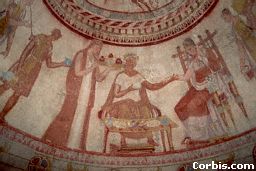| Group | Single |
| Geography | Thracians used to live in the Lower Danube region, on territories of modern Rumania, Bulgaria, partly Greece, Turkey and Yugoslavia. They were a barbaric, warlike people whose population grew very steadily in ancient times due to what they made constant expansion to neighbour lands, threatening to Greeks, Illyrians and Macedonians. Thracians are believed to have come from Asia together with Greeks, and while Hellenes went further to Southern Balkans, Thracians together with Illyrians and Macedonians settled in plains and mountains of North Balkan regions. |
| History | Later Thracians became more or less civilized under the Greek influence, and even established their own kingdom in southern Bulgaria in the 5th century BC. Some Thracians migrated into Asia Minor and established there a kingdom named Viphynia. Then Thrace became successively a Macedonian, Roman, and Byzantine province, while its northern parts, populated by Dacians, were kept by nomads from Asia. The language is known from a few inscriptions written in Greek alphabet both in Thrace and in Asia Minor (the so-called Mysian inscriptions), and mostly by words given in Greek manuals. |
| Phonetics | 10 vowels were divided into long and short ones, there were four or six diphthongs and 18 consonants. Some signs of a consonant shift close to that in Germanic is visible in some words. Another feature important for the studies of the language is the noticeable ablaut in the roots. |
| Morphology | Inscriptions and glosses allow to note several noun endings (genitive, dative, locative) and verbal formants. There are adjective ending in -nos / -mnos reminding Greek past participles. |
| Lexicon | The vocabulary consists of about 1400 words, mainly personal and place names, names of plants and glosses. Most of words can be traced back to Indo-European origins. |
| Writing | Greek alphabet |
| Close Contacts | Illyrian, Phrygian, Greek and other languages of the Balkans. Dacian was a northern variety of Thracian. Many roots are cognate to Baltic and Slavic terms. |
| Sample | likes : braterais patrizi isk.
Undeciphered (Mysian), though the words braterais 'by the brothers' and patrizi 'to the fathers' are present |
| Picture |  |
| More info |